Entrepreneurship and Small Business Management: Growth and Ventures
VerifiedAdded on 2024/06/12
|29
|5067
|449
Report
AI Summary
This report delves into the multifaceted world of entrepreneurship and small business management, focusing on the various types of entrepreneurial ventures and their significance. It examines the contributions of micro and small businesses to the UK economy over the past three years, supported by recent data, and analyzes their role at local, regional, national, and international levels. The report further discusses the diverse range of entrepreneurial ventures in both the public and corporate sectors, critically examining their scope, development, and growth. It concludes by highlighting the importance of entrepreneurial ventures in influencing society and the economy, recommending supportive policies and financial assistance to foster their growth and contribution to the UK's economic landscape. Desklib provides a platform to access this report and many other solved assignments for students.
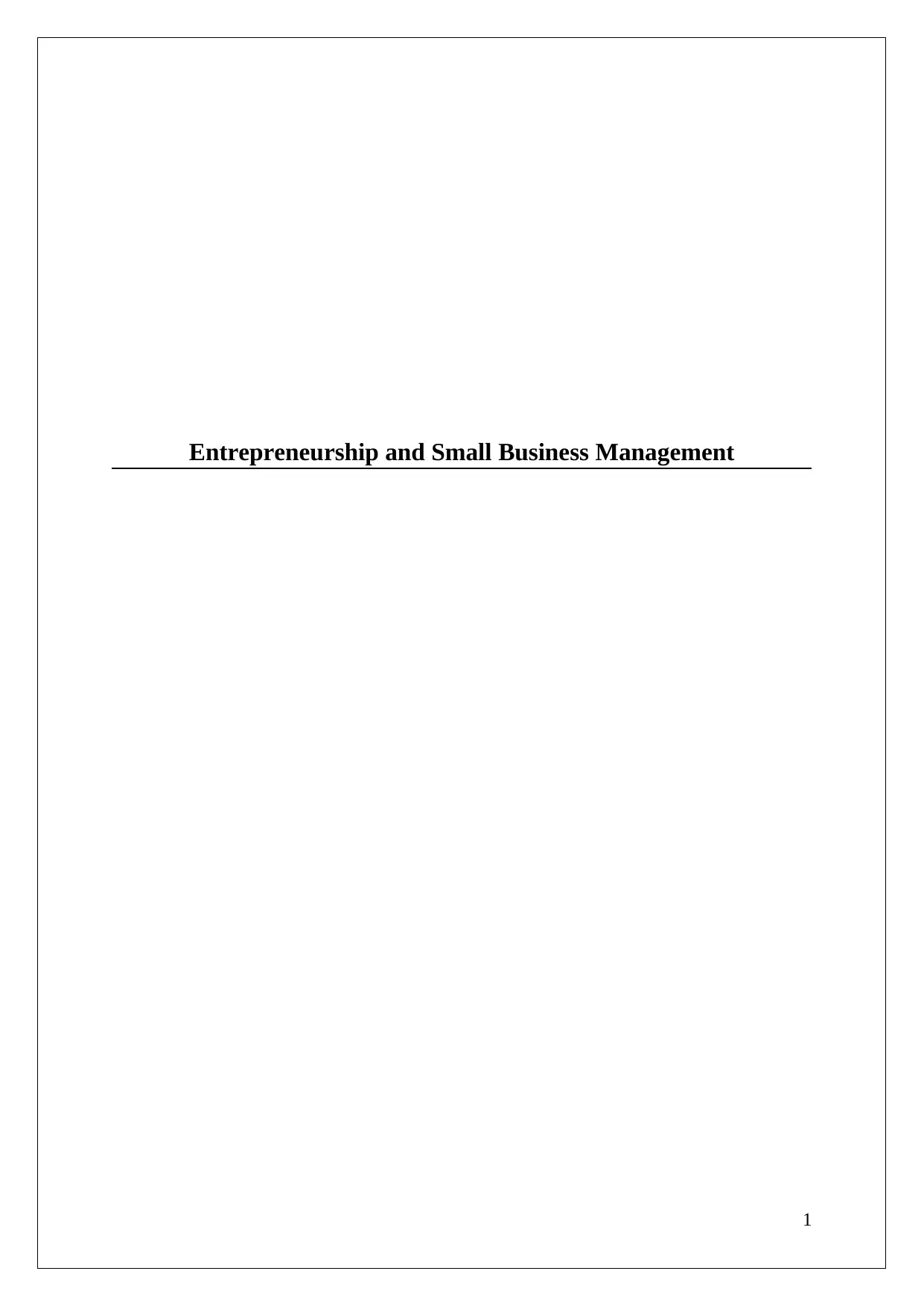
Entrepreneurship and Small Business Management
1
1
Paraphrase This Document
Need a fresh take? Get an instant paraphrase of this document with our AI Paraphraser

Table of Contents
Introduction................................................................................................................................3
Task 1.........................................................................................................................................4
Task 2.......................................................................................................................................10
Task 3.......................................................................................................................................12
Conclusion................................................................................................................................17
References................................................................................................................................18
Appendix..................................................................................................................................20
2
Introduction................................................................................................................................3
Task 1.........................................................................................................................................4
Task 2.......................................................................................................................................10
Task 3.......................................................................................................................................12
Conclusion................................................................................................................................17
References................................................................................................................................18
Appendix..................................................................................................................................20
2

Introduction
Entrepreneurship is the setting up a business which involves a lot of risk. In this assignment
the different ventures of entrepreneurship will be discussed. The impact of small business and
start ups in the UK economy is also some that will be discussed in this assignment. The
assignment will also focus on the different aspects of entrepreneurial mindset. In the end
there is also explanation on the environment that fosters and hinders entrepreneurs.
3
Entrepreneurship is the setting up a business which involves a lot of risk. In this assignment
the different ventures of entrepreneurship will be discussed. The impact of small business and
start ups in the UK economy is also some that will be discussed in this assignment. The
assignment will also focus on the different aspects of entrepreneurial mindset. In the end
there is also explanation on the environment that fosters and hinders entrepreneurs.
3
⊘ This is a preview!⊘
Do you want full access?
Subscribe today to unlock all pages.

Trusted by 1+ million students worldwide
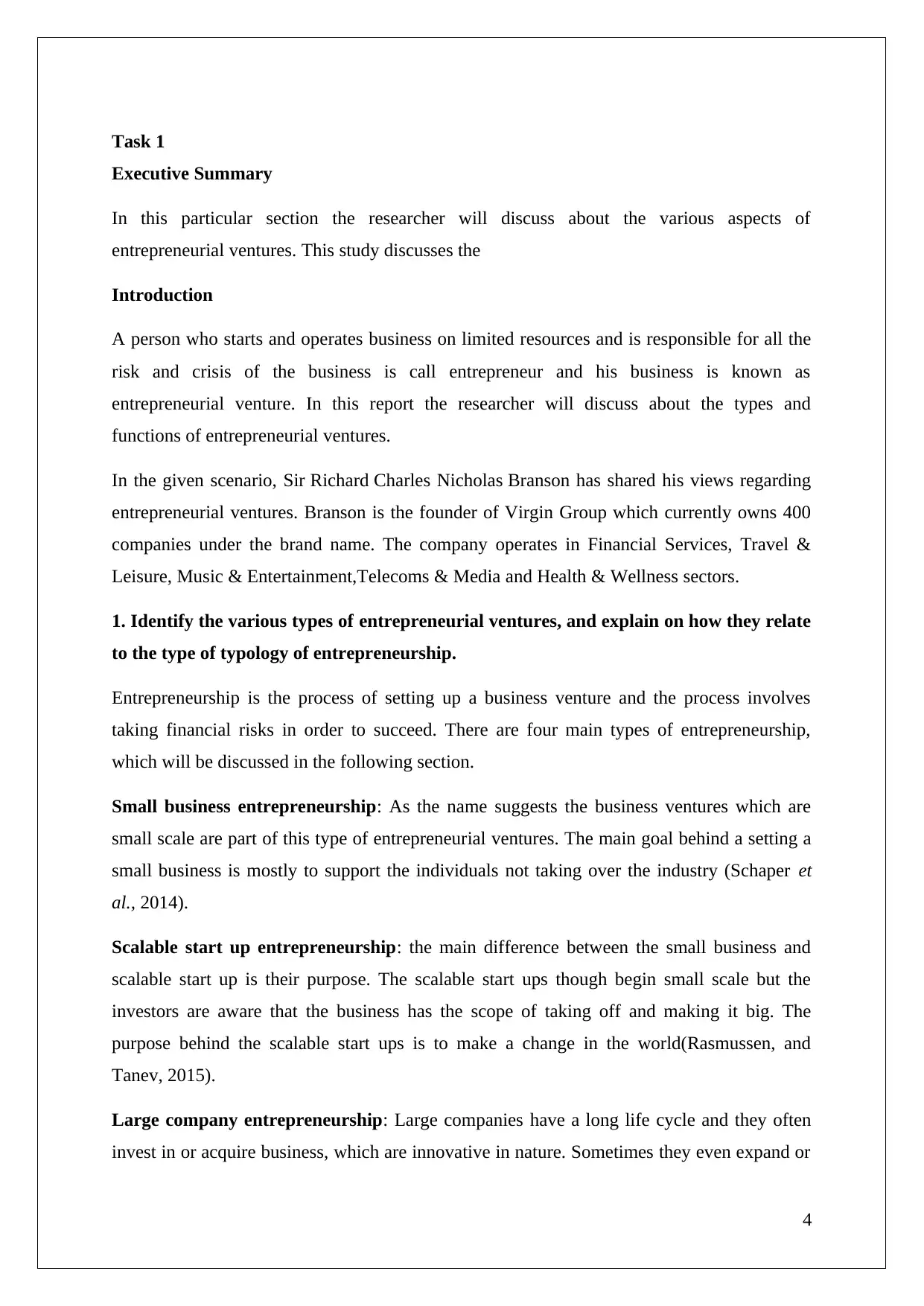
Task 1
Executive Summary
In this particular section the researcher will discuss about the various aspects of
entrepreneurial ventures. This study discusses the
Introduction
A person who starts and operates business on limited resources and is responsible for all the
risk and crisis of the business is call entrepreneur and his business is known as
entrepreneurial venture. In this report the researcher will discuss about the types and
functions of entrepreneurial ventures.
In the given scenario, Sir Richard Charles Nicholas Branson has shared his views regarding
entrepreneurial ventures. Branson is the founder of Virgin Group which currently owns 400
companies under the brand name. The company operates in Financial Services, Travel &
Leisure, Music & Entertainment,Telecoms & Media and Health & Wellness sectors.
1. Identify the various types of entrepreneurial ventures, and explain on how they relate
to the type of typology of entrepreneurship.
Entrepreneurship is the process of setting up a business venture and the process involves
taking financial risks in order to succeed. There are four main types of entrepreneurship,
which will be discussed in the following section.
Small business entrepreneurship: As the name suggests the business ventures which are
small scale are part of this type of entrepreneurial ventures. The main goal behind a setting a
small business is mostly to support the individuals not taking over the industry (Schaper et
al., 2014).
Scalable start up entrepreneurship: the main difference between the small business and
scalable start up is their purpose. The scalable start ups though begin small scale but the
investors are aware that the business has the scope of taking off and making it big. The
purpose behind the scalable start ups is to make a change in the world(Rasmussen, and
Tanev, 2015).
Large company entrepreneurship: Large companies have a long life cycle and they often
invest in or acquire business, which are innovative in nature. Sometimes they even expand or
4
Executive Summary
In this particular section the researcher will discuss about the various aspects of
entrepreneurial ventures. This study discusses the
Introduction
A person who starts and operates business on limited resources and is responsible for all the
risk and crisis of the business is call entrepreneur and his business is known as
entrepreneurial venture. In this report the researcher will discuss about the types and
functions of entrepreneurial ventures.
In the given scenario, Sir Richard Charles Nicholas Branson has shared his views regarding
entrepreneurial ventures. Branson is the founder of Virgin Group which currently owns 400
companies under the brand name. The company operates in Financial Services, Travel &
Leisure, Music & Entertainment,Telecoms & Media and Health & Wellness sectors.
1. Identify the various types of entrepreneurial ventures, and explain on how they relate
to the type of typology of entrepreneurship.
Entrepreneurship is the process of setting up a business venture and the process involves
taking financial risks in order to succeed. There are four main types of entrepreneurship,
which will be discussed in the following section.
Small business entrepreneurship: As the name suggests the business ventures which are
small scale are part of this type of entrepreneurial ventures. The main goal behind a setting a
small business is mostly to support the individuals not taking over the industry (Schaper et
al., 2014).
Scalable start up entrepreneurship: the main difference between the small business and
scalable start up is their purpose. The scalable start ups though begin small scale but the
investors are aware that the business has the scope of taking off and making it big. The
purpose behind the scalable start ups is to make a change in the world(Rasmussen, and
Tanev, 2015).
Large company entrepreneurship: Large companies have a long life cycle and they often
invest in or acquire business, which are innovative in nature. Sometimes they even expand or
4
Paraphrase This Document
Need a fresh take? Get an instant paraphrase of this document with our AI Paraphraser
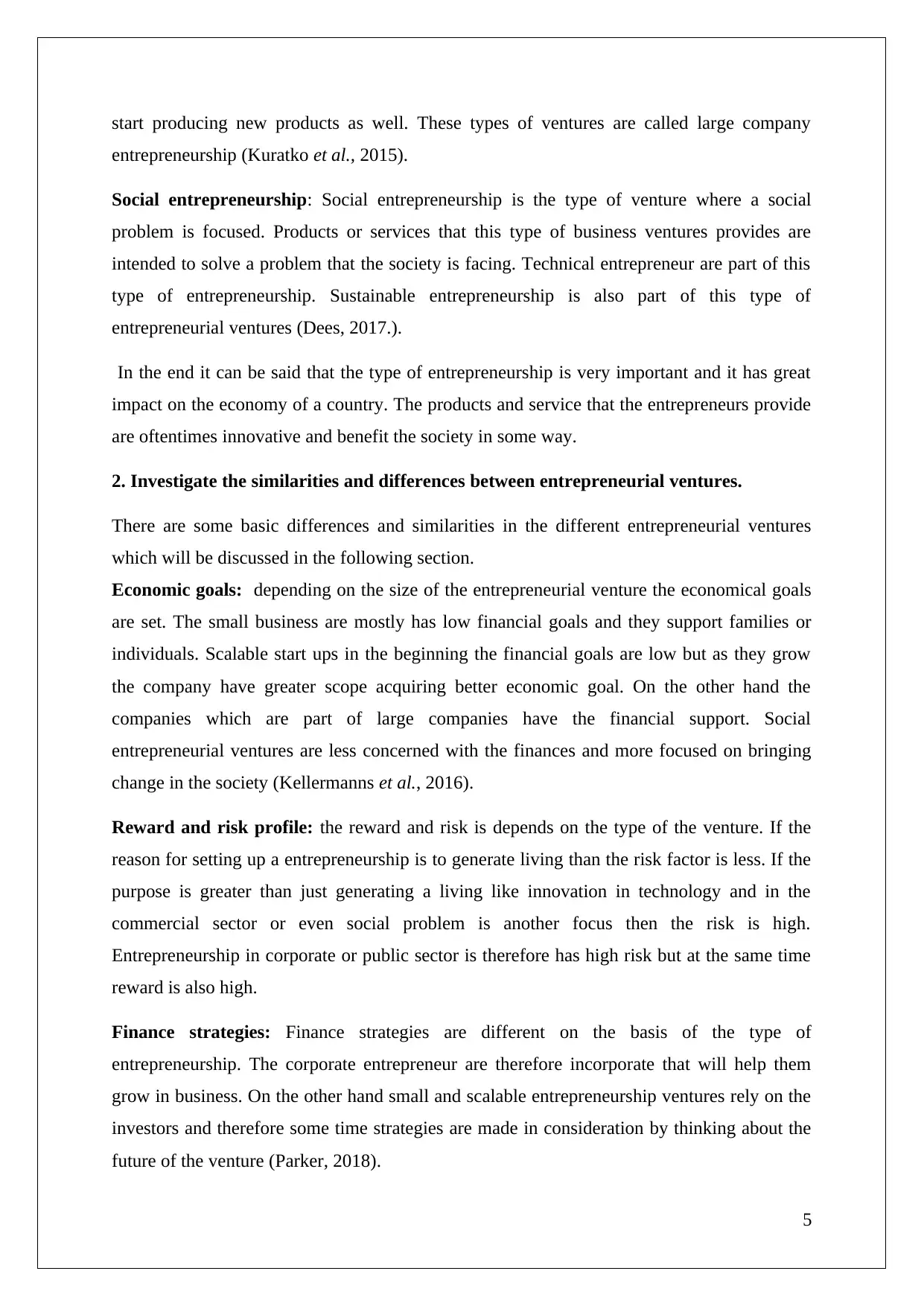
start producing new products as well. These types of ventures are called large company
entrepreneurship (Kuratko et al., 2015).
Social entrepreneurship: Social entrepreneurship is the type of venture where a social
problem is focused. Products or services that this type of business ventures provides are
intended to solve a problem that the society is facing. Technical entrepreneur are part of this
type of entrepreneurship. Sustainable entrepreneurship is also part of this type of
entrepreneurial ventures (Dees, 2017.).
In the end it can be said that the type of entrepreneurship is very important and it has great
impact on the economy of a country. The products and service that the entrepreneurs provide
are oftentimes innovative and benefit the society in some way.
2. Investigate the similarities and differences between entrepreneurial ventures.
There are some basic differences and similarities in the different entrepreneurial ventures
which will be discussed in the following section.
Economic goals: depending on the size of the entrepreneurial venture the economical goals
are set. The small business are mostly has low financial goals and they support families or
individuals. Scalable start ups in the beginning the financial goals are low but as they grow
the company have greater scope acquiring better economic goal. On the other hand the
companies which are part of large companies have the financial support. Social
entrepreneurial ventures are less concerned with the finances and more focused on bringing
change in the society (Kellermanns et al., 2016).
Reward and risk profile: the reward and risk is depends on the type of the venture. If the
reason for setting up a entrepreneurship is to generate living than the risk factor is less. If the
purpose is greater than just generating a living like innovation in technology and in the
commercial sector or even social problem is another focus then the risk is high.
Entrepreneurship in corporate or public sector is therefore has high risk but at the same time
reward is also high.
Finance strategies: Finance strategies are different on the basis of the type of
entrepreneurship. The corporate entrepreneur are therefore incorporate that will help them
grow in business. On the other hand small and scalable entrepreneurship ventures rely on the
investors and therefore some time strategies are made in consideration by thinking about the
future of the venture (Parker, 2018).
5
entrepreneurship (Kuratko et al., 2015).
Social entrepreneurship: Social entrepreneurship is the type of venture where a social
problem is focused. Products or services that this type of business ventures provides are
intended to solve a problem that the society is facing. Technical entrepreneur are part of this
type of entrepreneurship. Sustainable entrepreneurship is also part of this type of
entrepreneurial ventures (Dees, 2017.).
In the end it can be said that the type of entrepreneurship is very important and it has great
impact on the economy of a country. The products and service that the entrepreneurs provide
are oftentimes innovative and benefit the society in some way.
2. Investigate the similarities and differences between entrepreneurial ventures.
There are some basic differences and similarities in the different entrepreneurial ventures
which will be discussed in the following section.
Economic goals: depending on the size of the entrepreneurial venture the economical goals
are set. The small business are mostly has low financial goals and they support families or
individuals. Scalable start ups in the beginning the financial goals are low but as they grow
the company have greater scope acquiring better economic goal. On the other hand the
companies which are part of large companies have the financial support. Social
entrepreneurial ventures are less concerned with the finances and more focused on bringing
change in the society (Kellermanns et al., 2016).
Reward and risk profile: the reward and risk is depends on the type of the venture. If the
reason for setting up a entrepreneurship is to generate living than the risk factor is less. If the
purpose is greater than just generating a living like innovation in technology and in the
commercial sector or even social problem is another focus then the risk is high.
Entrepreneurship in corporate or public sector is therefore has high risk but at the same time
reward is also high.
Finance strategies: Finance strategies are different on the basis of the type of
entrepreneurship. The corporate entrepreneur are therefore incorporate that will help them
grow in business. On the other hand small and scalable entrepreneurship ventures rely on the
investors and therefore some time strategies are made in consideration by thinking about the
future of the venture (Parker, 2018).
5

Environment: The environment on the all the type of entrepreneurship venture is very
similar. The entrepreneurs are very driven and creative. These ventures maintain this trait in
their business environment as well. all types of venture social to corporate entrepreneurship
ventures gives a challenging business environment and the employees are also encourages to
utilise their creativity (Pinkse, and Groot, 2015).
There might be some differences in the way different types of entrepreneurship ventures are
operated but the basic purpose is always related, which is to bring a change with innovation
and creativity.
6
similar. The entrepreneurs are very driven and creative. These ventures maintain this trait in
their business environment as well. all types of venture social to corporate entrepreneurship
ventures gives a challenging business environment and the employees are also encourages to
utilise their creativity (Pinkse, and Groot, 2015).
There might be some differences in the way different types of entrepreneurship ventures are
operated but the basic purpose is always related, which is to bring a change with innovation
and creativity.
6
⊘ This is a preview!⊘
Do you want full access?
Subscribe today to unlock all pages.

Trusted by 1+ million students worldwide
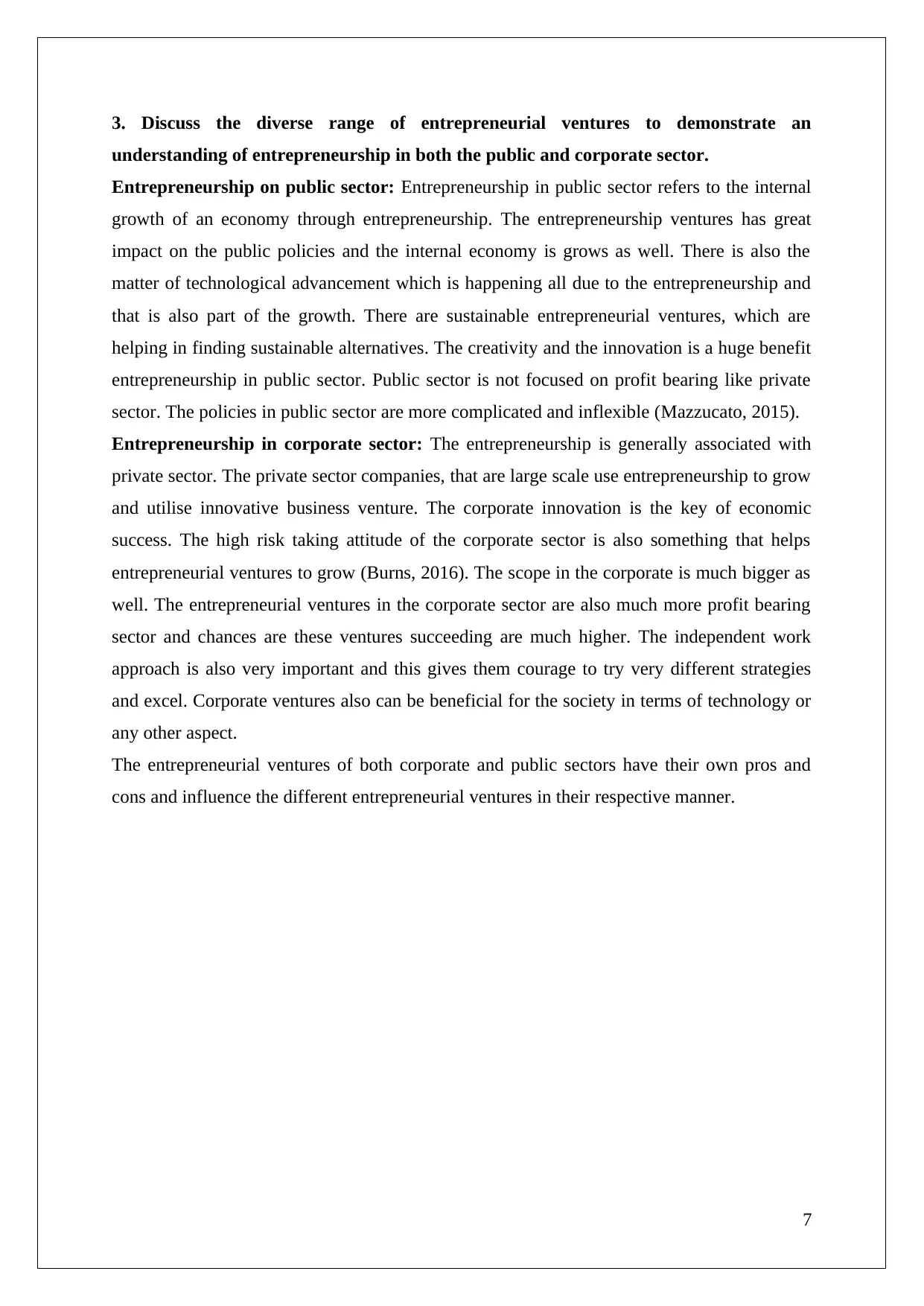
3. Discuss the diverse range of entrepreneurial ventures to demonstrate an
understanding of entrepreneurship in both the public and corporate sector.
Entrepreneurship on public sector: Entrepreneurship in public sector refers to the internal
growth of an economy through entrepreneurship. The entrepreneurship ventures has great
impact on the public policies and the internal economy is grows as well. There is also the
matter of technological advancement which is happening all due to the entrepreneurship and
that is also part of the growth. There are sustainable entrepreneurial ventures, which are
helping in finding sustainable alternatives. The creativity and the innovation is a huge benefit
entrepreneurship in public sector. Public sector is not focused on profit bearing like private
sector. The policies in public sector are more complicated and inflexible (Mazzucato, 2015).
Entrepreneurship in corporate sector: The entrepreneurship is generally associated with
private sector. The private sector companies, that are large scale use entrepreneurship to grow
and utilise innovative business venture. The corporate innovation is the key of economic
success. The high risk taking attitude of the corporate sector is also something that helps
entrepreneurial ventures to grow (Burns, 2016). The scope in the corporate is much bigger as
well. The entrepreneurial ventures in the corporate sector are also much more profit bearing
sector and chances are these ventures succeeding are much higher. The independent work
approach is also very important and this gives them courage to try very different strategies
and excel. Corporate ventures also can be beneficial for the society in terms of technology or
any other aspect.
The entrepreneurial ventures of both corporate and public sectors have their own pros and
cons and influence the different entrepreneurial ventures in their respective manner.
7
understanding of entrepreneurship in both the public and corporate sector.
Entrepreneurship on public sector: Entrepreneurship in public sector refers to the internal
growth of an economy through entrepreneurship. The entrepreneurship ventures has great
impact on the public policies and the internal economy is grows as well. There is also the
matter of technological advancement which is happening all due to the entrepreneurship and
that is also part of the growth. There are sustainable entrepreneurial ventures, which are
helping in finding sustainable alternatives. The creativity and the innovation is a huge benefit
entrepreneurship in public sector. Public sector is not focused on profit bearing like private
sector. The policies in public sector are more complicated and inflexible (Mazzucato, 2015).
Entrepreneurship in corporate sector: The entrepreneurship is generally associated with
private sector. The private sector companies, that are large scale use entrepreneurship to grow
and utilise innovative business venture. The corporate innovation is the key of economic
success. The high risk taking attitude of the corporate sector is also something that helps
entrepreneurial ventures to grow (Burns, 2016). The scope in the corporate is much bigger as
well. The entrepreneurial ventures in the corporate sector are also much more profit bearing
sector and chances are these ventures succeeding are much higher. The independent work
approach is also very important and this gives them courage to try very different strategies
and excel. Corporate ventures also can be beneficial for the society in terms of technology or
any other aspect.
The entrepreneurial ventures of both corporate and public sectors have their own pros and
cons and influence the different entrepreneurial ventures in their respective manner.
7
Paraphrase This Document
Need a fresh take? Get an instant paraphrase of this document with our AI Paraphraser
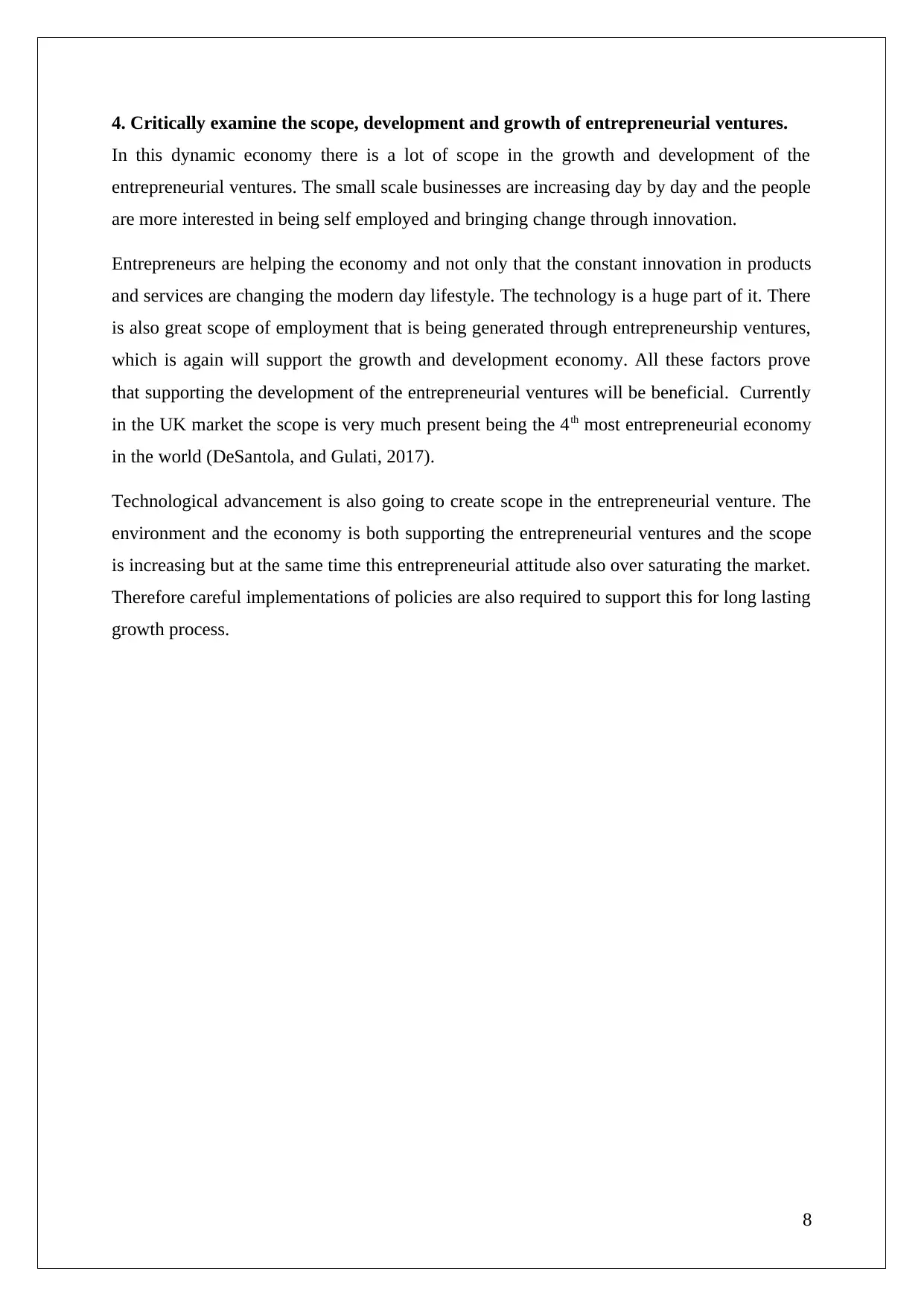
4. Critically examine the scope, development and growth of entrepreneurial ventures.
In this dynamic economy there is a lot of scope in the growth and development of the
entrepreneurial ventures. The small scale businesses are increasing day by day and the people
are more interested in being self employed and bringing change through innovation.
Entrepreneurs are helping the economy and not only that the constant innovation in products
and services are changing the modern day lifestyle. The technology is a huge part of it. There
is also great scope of employment that is being generated through entrepreneurship ventures,
which is again will support the growth and development economy. All these factors prove
that supporting the development of the entrepreneurial ventures will be beneficial. Currently
in the UK market the scope is very much present being the 4th most entrepreneurial economy
in the world (DeSantola, and Gulati, 2017).
Technological advancement is also going to create scope in the entrepreneurial venture. The
environment and the economy is both supporting the entrepreneurial ventures and the scope
is increasing but at the same time this entrepreneurial attitude also over saturating the market.
Therefore careful implementations of policies are also required to support this for long lasting
growth process.
8
In this dynamic economy there is a lot of scope in the growth and development of the
entrepreneurial ventures. The small scale businesses are increasing day by day and the people
are more interested in being self employed and bringing change through innovation.
Entrepreneurs are helping the economy and not only that the constant innovation in products
and services are changing the modern day lifestyle. The technology is a huge part of it. There
is also great scope of employment that is being generated through entrepreneurship ventures,
which is again will support the growth and development economy. All these factors prove
that supporting the development of the entrepreneurial ventures will be beneficial. Currently
in the UK market the scope is very much present being the 4th most entrepreneurial economy
in the world (DeSantola, and Gulati, 2017).
Technological advancement is also going to create scope in the entrepreneurial venture. The
environment and the economy is both supporting the entrepreneurial ventures and the scope
is increasing but at the same time this entrepreneurial attitude also over saturating the market.
Therefore careful implementations of policies are also required to support this for long lasting
growth process.
8
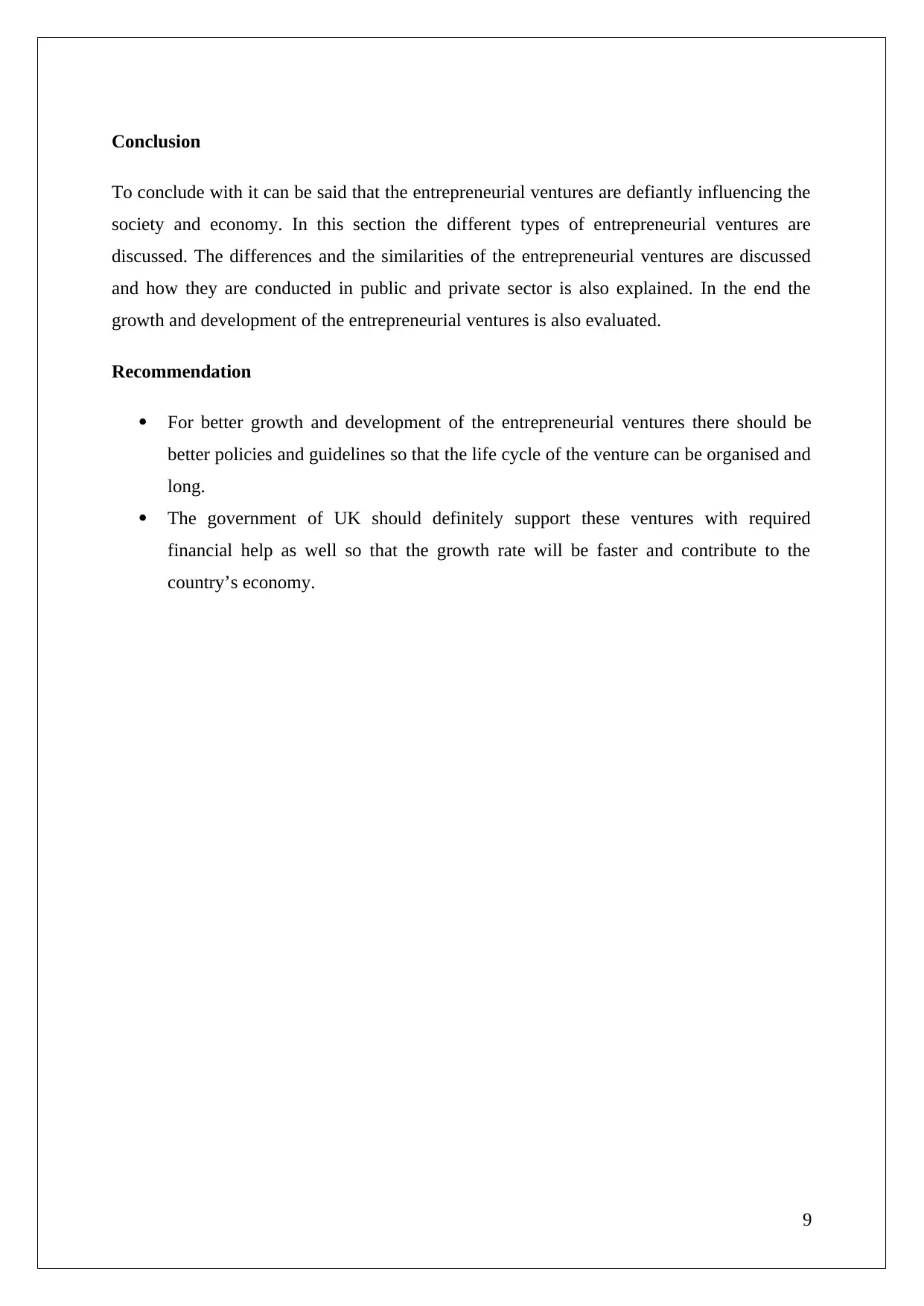
Conclusion
To conclude with it can be said that the entrepreneurial ventures are defiantly influencing the
society and economy. In this section the different types of entrepreneurial ventures are
discussed. The differences and the similarities of the entrepreneurial ventures are discussed
and how they are conducted in public and private sector is also explained. In the end the
growth and development of the entrepreneurial ventures is also evaluated.
Recommendation
For better growth and development of the entrepreneurial ventures there should be
better policies and guidelines so that the life cycle of the venture can be organised and
long.
The government of UK should definitely support these ventures with required
financial help as well so that the growth rate will be faster and contribute to the
country’s economy.
9
To conclude with it can be said that the entrepreneurial ventures are defiantly influencing the
society and economy. In this section the different types of entrepreneurial ventures are
discussed. The differences and the similarities of the entrepreneurial ventures are discussed
and how they are conducted in public and private sector is also explained. In the end the
growth and development of the entrepreneurial ventures is also evaluated.
Recommendation
For better growth and development of the entrepreneurial ventures there should be
better policies and guidelines so that the life cycle of the venture can be organised and
long.
The government of UK should definitely support these ventures with required
financial help as well so that the growth rate will be faster and contribute to the
country’s economy.
9
⊘ This is a preview!⊘
Do you want full access?
Subscribe today to unlock all pages.

Trusted by 1+ million students worldwide
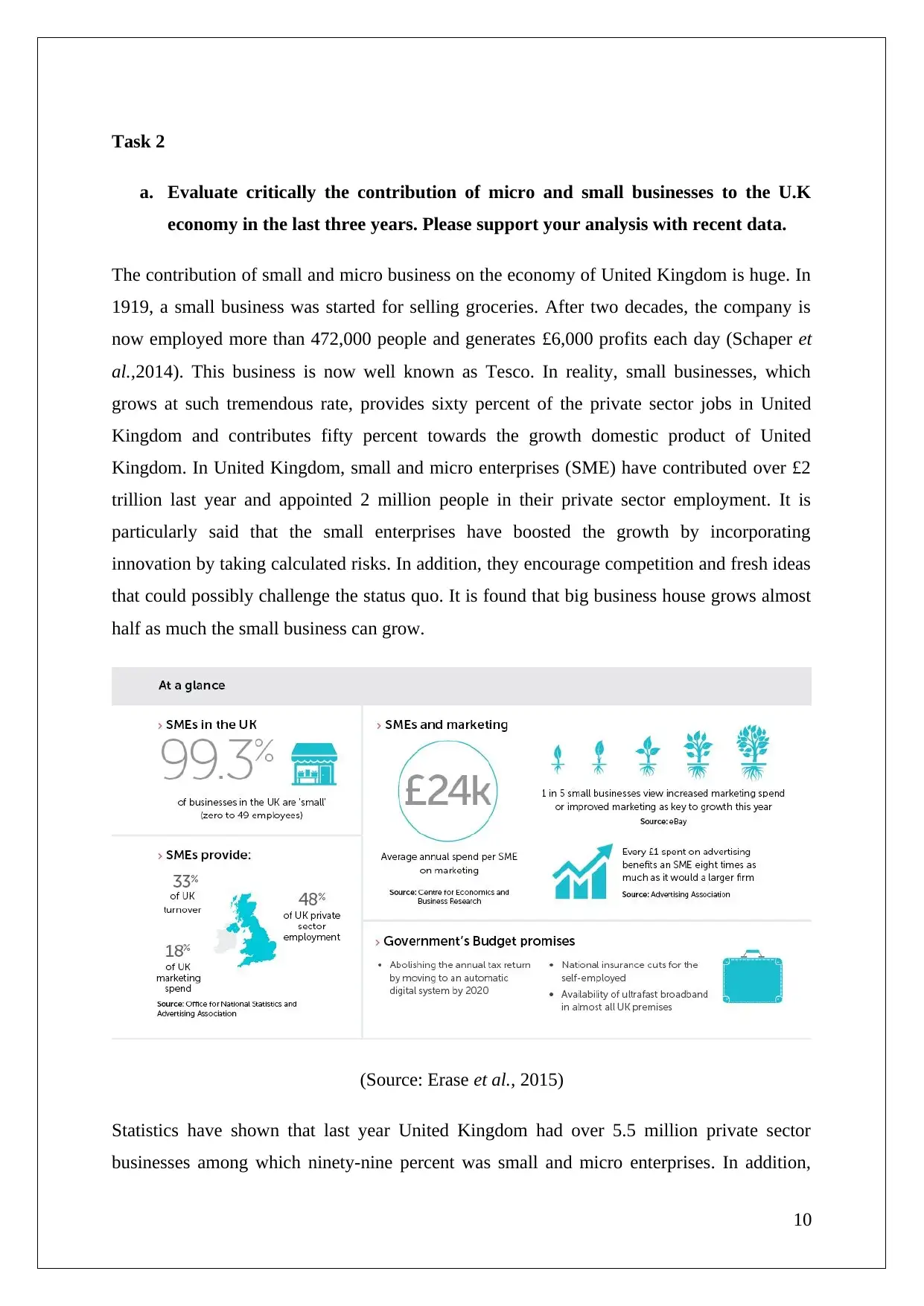
Task 2
a. Evaluate critically the contribution of micro and small businesses to the U.K
economy in the last three years. Please support your analysis with recent data.
The contribution of small and micro business on the economy of United Kingdom is huge. In
1919, a small business was started for selling groceries. After two decades, the company is
now employed more than 472,000 people and generates £6,000 profits each day (Schaper et
al.,2014). This business is now well known as Tesco. In reality, small businesses, which
grows at such tremendous rate, provides sixty percent of the private sector jobs in United
Kingdom and contributes fifty percent towards the growth domestic product of United
Kingdom. In United Kingdom, small and micro enterprises (SME) have contributed over £2
trillion last year and appointed 2 million people in their private sector employment. It is
particularly said that the small enterprises have boosted the growth by incorporating
innovation by taking calculated risks. In addition, they encourage competition and fresh ideas
that could possibly challenge the status quo. It is found that big business house grows almost
half as much the small business can grow.
(Source: Erase et al., 2015)
Statistics have shown that last year United Kingdom had over 5.5 million private sector
businesses among which ninety-nine percent was small and micro enterprises. In addition,
10
a. Evaluate critically the contribution of micro and small businesses to the U.K
economy in the last three years. Please support your analysis with recent data.
The contribution of small and micro business on the economy of United Kingdom is huge. In
1919, a small business was started for selling groceries. After two decades, the company is
now employed more than 472,000 people and generates £6,000 profits each day (Schaper et
al.,2014). This business is now well known as Tesco. In reality, small businesses, which
grows at such tremendous rate, provides sixty percent of the private sector jobs in United
Kingdom and contributes fifty percent towards the growth domestic product of United
Kingdom. In United Kingdom, small and micro enterprises (SME) have contributed over £2
trillion last year and appointed 2 million people in their private sector employment. It is
particularly said that the small enterprises have boosted the growth by incorporating
innovation by taking calculated risks. In addition, they encourage competition and fresh ideas
that could possibly challenge the status quo. It is found that big business house grows almost
half as much the small business can grow.
(Source: Erase et al., 2015)
Statistics have shown that last year United Kingdom had over 5.5 million private sector
businesses among which ninety-nine percent was small and micro enterprises. In addition,
10
Paraphrase This Document
Need a fresh take? Get an instant paraphrase of this document with our AI Paraphraser
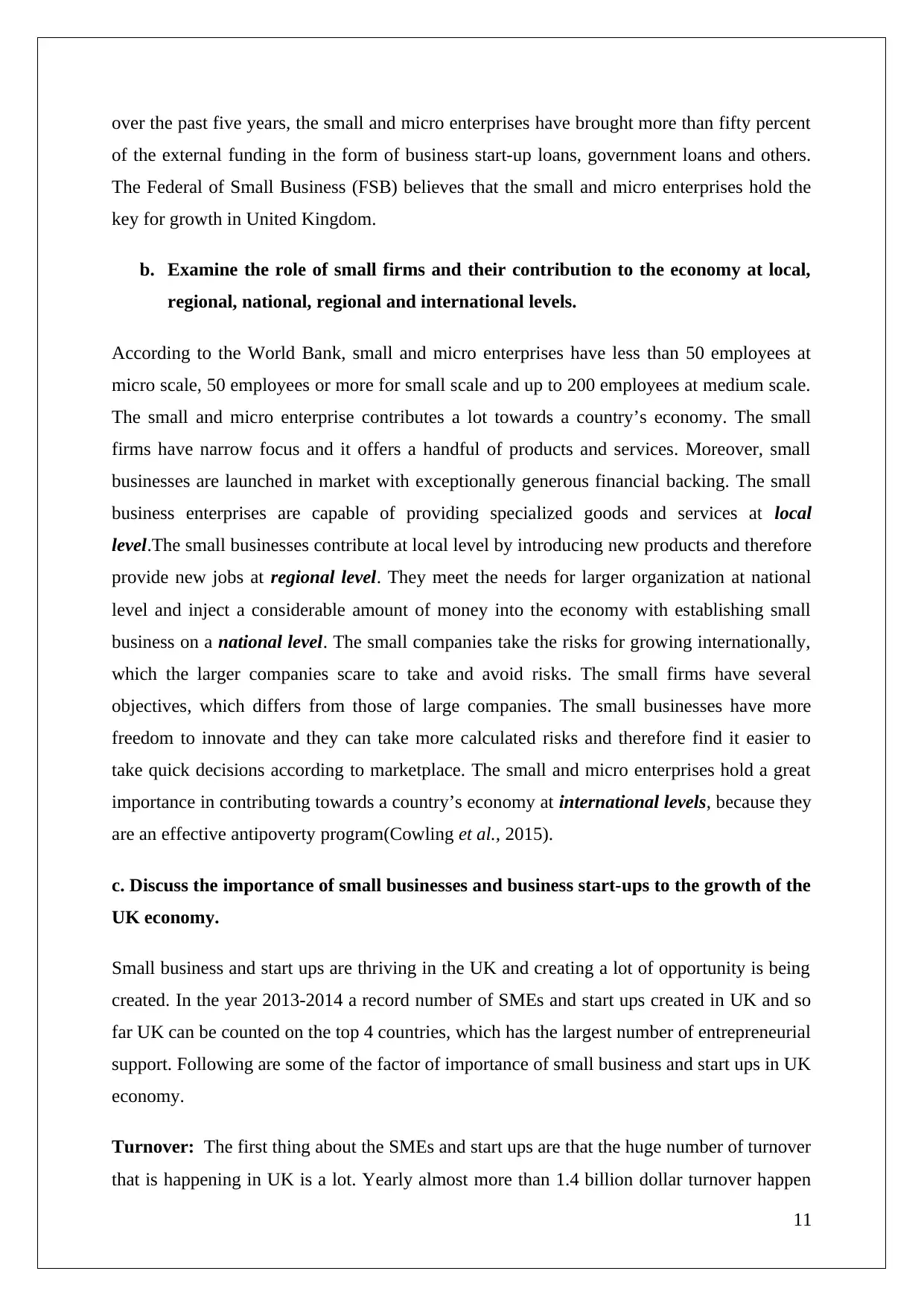
over the past five years, the small and micro enterprises have brought more than fifty percent
of the external funding in the form of business start-up loans, government loans and others.
The Federal of Small Business (FSB) believes that the small and micro enterprises hold the
key for growth in United Kingdom.
b. Examine the role of small firms and their contribution to the economy at local,
regional, national, regional and international levels.
According to the World Bank, small and micro enterprises have less than 50 employees at
micro scale, 50 employees or more for small scale and up to 200 employees at medium scale.
The small and micro enterprise contributes a lot towards a country’s economy. The small
firms have narrow focus and it offers a handful of products and services. Moreover, small
businesses are launched in market with exceptionally generous financial backing. The small
business enterprises are capable of providing specialized goods and services at local
level.The small businesses contribute at local level by introducing new products and therefore
provide new jobs at regional level. They meet the needs for larger organization at national
level and inject a considerable amount of money into the economy with establishing small
business on a national level. The small companies take the risks for growing internationally,
which the larger companies scare to take and avoid risks. The small firms have several
objectives, which differs from those of large companies. The small businesses have more
freedom to innovate and they can take more calculated risks and therefore find it easier to
take quick decisions according to marketplace. The small and micro enterprises hold a great
importance in contributing towards a country’s economy at international levels, because they
are an effective antipoverty program(Cowling et al., 2015).
c. Discuss the importance of small businesses and business start-ups to the growth of the
UK economy.
Small business and start ups are thriving in the UK and creating a lot of opportunity is being
created. In the year 2013-2014 a record number of SMEs and start ups created in UK and so
far UK can be counted on the top 4 countries, which has the largest number of entrepreneurial
support. Following are some of the factor of importance of small business and start ups in UK
economy.
Turnover: The first thing about the SMEs and start ups are that the huge number of turnover
that is happening in UK is a lot. Yearly almost more than 1.4 billion dollar turnover happen
11
of the external funding in the form of business start-up loans, government loans and others.
The Federal of Small Business (FSB) believes that the small and micro enterprises hold the
key for growth in United Kingdom.
b. Examine the role of small firms and their contribution to the economy at local,
regional, national, regional and international levels.
According to the World Bank, small and micro enterprises have less than 50 employees at
micro scale, 50 employees or more for small scale and up to 200 employees at medium scale.
The small and micro enterprise contributes a lot towards a country’s economy. The small
firms have narrow focus and it offers a handful of products and services. Moreover, small
businesses are launched in market with exceptionally generous financial backing. The small
business enterprises are capable of providing specialized goods and services at local
level.The small businesses contribute at local level by introducing new products and therefore
provide new jobs at regional level. They meet the needs for larger organization at national
level and inject a considerable amount of money into the economy with establishing small
business on a national level. The small companies take the risks for growing internationally,
which the larger companies scare to take and avoid risks. The small firms have several
objectives, which differs from those of large companies. The small businesses have more
freedom to innovate and they can take more calculated risks and therefore find it easier to
take quick decisions according to marketplace. The small and micro enterprises hold a great
importance in contributing towards a country’s economy at international levels, because they
are an effective antipoverty program(Cowling et al., 2015).
c. Discuss the importance of small businesses and business start-ups to the growth of the
UK economy.
Small business and start ups are thriving in the UK and creating a lot of opportunity is being
created. In the year 2013-2014 a record number of SMEs and start ups created in UK and so
far UK can be counted on the top 4 countries, which has the largest number of entrepreneurial
support. Following are some of the factor of importance of small business and start ups in UK
economy.
Turnover: The first thing about the SMEs and start ups are that the huge number of turnover
that is happening in UK is a lot. Yearly almost more than 1.4 billion dollar turnover happen
11
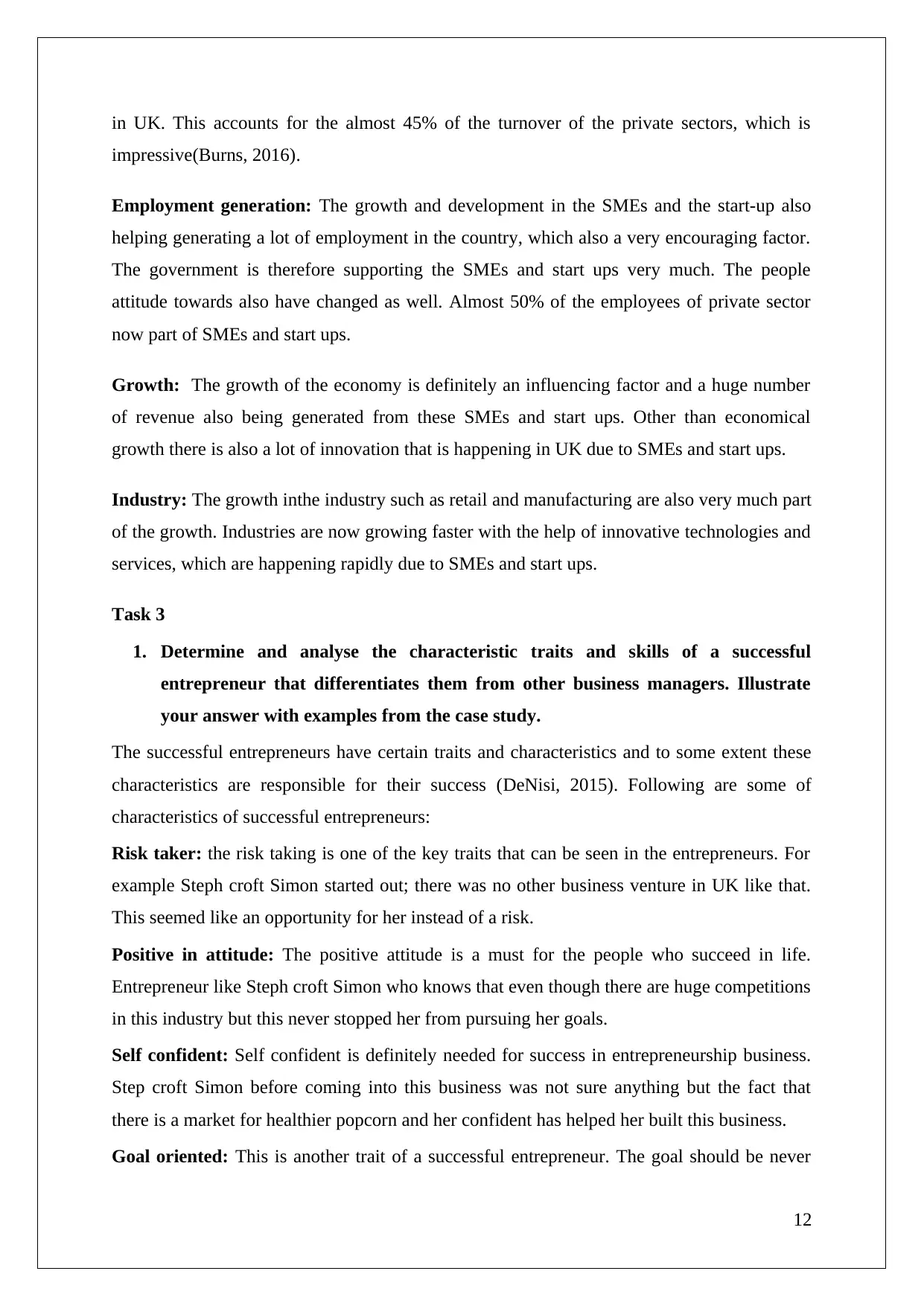
in UK. This accounts for the almost 45% of the turnover of the private sectors, which is
impressive(Burns, 2016).
Employment generation: The growth and development in the SMEs and the start-up also
helping generating a lot of employment in the country, which also a very encouraging factor.
The government is therefore supporting the SMEs and start ups very much. The people
attitude towards also have changed as well. Almost 50% of the employees of private sector
now part of SMEs and start ups.
Growth: The growth of the economy is definitely an influencing factor and a huge number
of revenue also being generated from these SMEs and start ups. Other than economical
growth there is also a lot of innovation that is happening in UK due to SMEs and start ups.
Industry: The growth inthe industry such as retail and manufacturing are also very much part
of the growth. Industries are now growing faster with the help of innovative technologies and
services, which are happening rapidly due to SMEs and start ups.
Task 3
1. Determine and analyse the characteristic traits and skills of a successful
entrepreneur that differentiates them from other business managers. Illustrate
your answer with examples from the case study.
The successful entrepreneurs have certain traits and characteristics and to some extent these
characteristics are responsible for their success (DeNisi, 2015). Following are some of
characteristics of successful entrepreneurs:
Risk taker: the risk taking is one of the key traits that can be seen in the entrepreneurs. For
example Steph croft Simon started out; there was no other business venture in UK like that.
This seemed like an opportunity for her instead of a risk.
Positive in attitude: The positive attitude is a must for the people who succeed in life.
Entrepreneur like Steph croft Simon who knows that even though there are huge competitions
in this industry but this never stopped her from pursuing her goals.
Self confident: Self confident is definitely needed for success in entrepreneurship business.
Step croft Simon before coming into this business was not sure anything but the fact that
there is a market for healthier popcorn and her confident has helped her built this business.
Goal oriented: This is another trait of a successful entrepreneur. The goal should be never
12
impressive(Burns, 2016).
Employment generation: The growth and development in the SMEs and the start-up also
helping generating a lot of employment in the country, which also a very encouraging factor.
The government is therefore supporting the SMEs and start ups very much. The people
attitude towards also have changed as well. Almost 50% of the employees of private sector
now part of SMEs and start ups.
Growth: The growth of the economy is definitely an influencing factor and a huge number
of revenue also being generated from these SMEs and start ups. Other than economical
growth there is also a lot of innovation that is happening in UK due to SMEs and start ups.
Industry: The growth inthe industry such as retail and manufacturing are also very much part
of the growth. Industries are now growing faster with the help of innovative technologies and
services, which are happening rapidly due to SMEs and start ups.
Task 3
1. Determine and analyse the characteristic traits and skills of a successful
entrepreneur that differentiates them from other business managers. Illustrate
your answer with examples from the case study.
The successful entrepreneurs have certain traits and characteristics and to some extent these
characteristics are responsible for their success (DeNisi, 2015). Following are some of
characteristics of successful entrepreneurs:
Risk taker: the risk taking is one of the key traits that can be seen in the entrepreneurs. For
example Steph croft Simon started out; there was no other business venture in UK like that.
This seemed like an opportunity for her instead of a risk.
Positive in attitude: The positive attitude is a must for the people who succeed in life.
Entrepreneur like Steph croft Simon who knows that even though there are huge competitions
in this industry but this never stopped her from pursuing her goals.
Self confident: Self confident is definitely needed for success in entrepreneurship business.
Step croft Simon before coming into this business was not sure anything but the fact that
there is a market for healthier popcorn and her confident has helped her built this business.
Goal oriented: This is another trait of a successful entrepreneur. The goal should be never
12
⊘ This is a preview!⊘
Do you want full access?
Subscribe today to unlock all pages.

Trusted by 1+ million students worldwide
1 out of 29
Related Documents
Your All-in-One AI-Powered Toolkit for Academic Success.
+13062052269
info@desklib.com
Available 24*7 on WhatsApp / Email
![[object Object]](/_next/static/media/star-bottom.7253800d.svg)
Unlock your academic potential
Copyright © 2020–2026 A2Z Services. All Rights Reserved. Developed and managed by ZUCOL.




